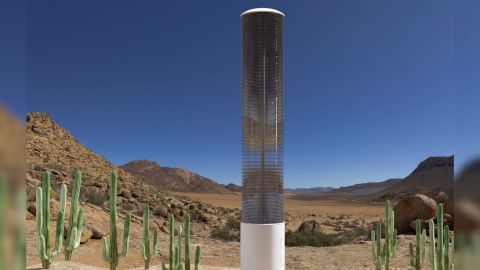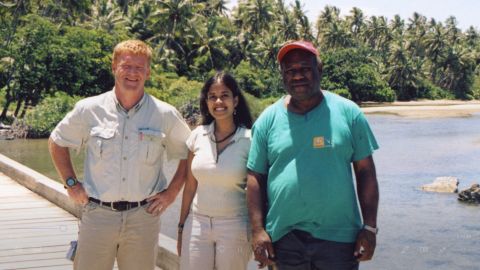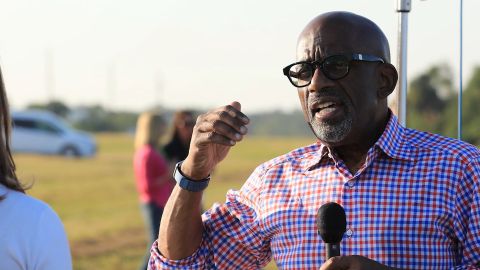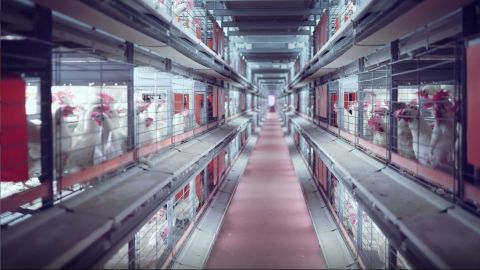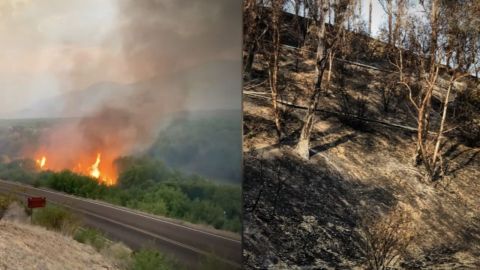It's decision time and
students, young people all
across America are leaning
in hard to bend politics
and attitudes to make the
big moves needed to
address climate change.
But, can these emerging
leaders also, just maybe,
be the ones who bridge
America's deep political
divide on climate change?
That would be earth
shattering.
I'm Frank Sesno, welcome
to Planet Forward from the
George Washington
University, produced in
association with the
Global Futures Laboratory
from Arizona State
University.
So here's an incredible
story: a teenager
passionate about the
planet, worried, angry,
frustrated that fires burn
and the earth warms, and
politicians are letting us
down.
Alexandria Villasenor is
15 years old.
She's the founder of Earth
Uprising who told the
world in her big speech,
climate change is
impacting us now and it's
robbing my generation of a
future.
Hi, Alexandria.
Hi.
Well, let me start by
asking you this.
How did your climate
strike and all your
advocacy prepare you for
that big speech at the
DNC?
So I've had the
opportunity to meet so
many people in this work
and also speak to
different audiences about
climate change.
So it's actually the
people that I've
interacted with in
activism are the ones that
have taught me not only
about climate change, but
about economics and even
politics.
So the DNC was a
comfortable platform and
young people really needed
to be heard on that level
too.
What has been the impact
of that speech, because
you were seen by millions
and millions of people?
I think that the biggest
impact is that people are
talking about climate
change more than they ever
have been before.
So in 2016, the DNC only
gave five minutes to
climate change, whereas in
2020, climate change has a
major part of the
conversation at the
convention.
So we're also seeing a lot
more media talk about
climate change, especially
in the context of the
extreme weather we're
having, such as the winds
in Iowa.
So, the intensified
hurricanes like we
recently saw in Louisiana
and of course, the
catastrophic
record-breaking wildfires
covering the entire West
Coast right now.
So I think having the DNC
platform, climate change
as the urgent issue it is,
is leading to more and
better media coverage of
the climate crisis.
How can the youth voice
maybe, just maybe be the
bridge that brings
together the two sides,
the very polarized, you
know, two sides of the
climate discussion in this
country?
Can that happen?
I think yes.
That definitely can
happen.
Recently, there's a study
that showed children
change their parents'
minds about climate
change.
So the study also found
out that teaching children
about climate change
raised their parents'
concern about it.
And it didn't matter what
their parents' political
views were.
So youth, I believe, are
the intergenerational
bridge for climate change
awareness.
And I think that we have
to be because of how
urgent this is, climate
change will affect our
generation the most.
So we have the most at
stake right now.
So have you ever talked to
a conservative peer or
their parents and actually
been put in that position
yourself?
What do you say?
Well, to be honest, we
usually don't speak to
skeptics because we've
found most of them to be
trolls and not worth our
time.
The youth movement got
wise about that really
fast.
So if they're not a troll,
but are maybe a politician
who continues to deny the
science or not act on
climate change at the
scale of the problem, I
mean, then we just end up
protesting about it and we
keep protesting them until
we get a seat at the table
and then they have to
listen to us.
So when I look at what
happened politically over
the past year, all the way
up to Joe Biden adopting
the most extensive climate
plan of any presidential
candidate ever, I can see
it's a combination of
protests and negotiation
that got us here.
And I also think that
getting Joe Biden onboard
was a successful
encounter, I think.
But Earth Uprising, my
organization, actually has
young people in
conservative areas where
climate deniers are very
prominent and they're
focusing on education.
And I really see them
starting to change the
conversation in their
community.
I have had encounters with
one climate denier
relative at, of course, a
Thanksgiving.
And one thing I found when
it comes to people who
don't really believe in
the science, what I start
off with is having a
common ground.
I think that coming off on
this more just talking on
a personal level can be
much more effective than
getting aggressive with
them because then people
go on the defense.
And so what I usually
start off with is starting
off saying how I've been
affected by the climate
crisis or how other young
people have, because
personal stories really
matter to people.
And that's how you start
to see a connection and
see people slowly start to
change this very narrow
mindset of not really
seeing the science and the
large issue that climate
change is.
You know, you went for
those Climate Strike
Fridays, all those Fridays
at the United Nations over
and over and over again.
Tell us, was there
something, a takeaway from
that experience?
Yeah, definitely.
It's been such a while
since I striked.
I ended up striking every
Friday all the way up
until the pandemic.
So it's been months.
And so I think, though,
one of the biggest
takeaways from that part
of my activism was how
much consistency, how much
consistency, consistency
over time really matters.
So it wasn't one strike
that made the difference.
It was all the strikes put
together over the period
of a year and a half that
made change.
And I think in climate
activism, we have to keep
steady pressure like that
and not let up with our
protests.
Alexandra, in your big DNC
speech, you had a line
that really struck me and
I wrote it down.
You said, "Climate change
is impacting us now and
it's robbing my generation
of a future." How do you
talk about that?
Yes, so that is absolutely
true.
And centering
environmental justice and
equity is the most
important part of creating
new climate solutions.
So the way we do this is
by centering the
narratives of these
communities and giving
them platforms to tell
their stories.
And so that's actually
what the Earth Focus
episode did for the youth
from the Marshall Islands,
South Africa, and Alaska.
So people have to see
what's happening and hear
the stories of those most
affected by the climate
crisis.
And that's what helps us
build inclusive and
equitable solutions.
What do you tell your
peers who want to be
activists, leaders in
climate?
So the first thing that I
tell young people to do is
find your climate story.
How are you being impacted
by the climate crisis?
Because if you look into
your community, you can
start to see how climate
change is personally
impacting you.
And that is a big
motivator for young people
to continue taking action
and being involved.
And once you find your
climate story, then you
can find what you want to
do about it.
Do you want to work in
solutions or do you want,
are you angry and just
want to do something and
you want to go strike or
protest?
And so then I recommend
finding an organization
that your message
resonates with the most,
because once you find a
group and a sense of
community of people to
uplift you and your work,
that's when you have more
of a sustainable activism.
And so I think that those
are the first steps that
people should take.
Alexandria, thank you so
much.
Thank you so much for
having me.
I met Rohan Agrawal
through Planet Forward.
He was a student
correspondent and wrote
stories on the food
system, sustainable
agriculture and technology
and innovation, as
solutions to these big
problems like hunger.
He traveled with us to
Rome for the UNFAO, world
food security conference.
At the University of
Mississippi, Rohan majors
in Computer Science and
International Relations.
He's from India, wants to
use his technical
knowledge to solve big
problems of climate
change, hunger and access
to education.
But what Rohan has
discovered is the power of
narrative, of storytelling
to engage and inspire
change.
Hey, Rohan!
Hello.
So, Rohan, I want to ask
you this question, from
your perspective as, I'm
going to call you a global
citizen and as a student
about to graduate, how do
you tell the story of
climate change that
relates and resonates with
climate change that
your peers and your parts
of the world?
I believe it's not about
just blatantly deporting
the data anymore, but
wrapping that data in a
narrative and painting a
picture that inspires
young people like myself
to take action because,
for example, all it took
was a 16 year old girl
from Sweden to get the
entire world
onto the streets.
How dare you?
It was her telling stories
about flooded cities and
tens of thousands of
people dying around the
world.
Or maybe her traveling on
a boat across the Atlantic
that the entire world
followed?
That is the power of
storytelling, according to
me.
And yeah, you're right.
Our generation and the
ones following will have
to live through the
impacts of climate change,
which means I think it
also becomes our
responsibility to tell
these stories and take
action.
So one thing, yes I'm from
a country of over 1.3
billion people, out of
which more than half of
the population is under
25.
That number is still
almost double the entire
population of the U.S.
I think that in itself is
a blessing and a curse in
my eyes, because yes,
India will be one of the
first few countries to
undergo the detrimental
effects of climate change.
And, those 600 million
people face the risk of
not being able to
potentially live their
entire life.
However, it also gives me
the hope that our young
voices have the power to
shape the world and also,
not letting leaders with
outdated ways of thinking,
deciding our future.
I think what struck me the
most about the debate here
is the debate itself and
perhaps the polarization
that follows the debate or
vice versa, if you say.
Because, I'm pretty sure
you can attest to this
when I say this, that it's
only here where the nouns
"scientists" and "experts"
are used as a political
punching bag at times.
I'm obsessed with
technology and finding an
easier way to do
something.
That is exactly how I
intend to contribute to
this global challenge by
using machine learning and
artificial intelligence
tools to find easier ways
to mitigate our greenhouse
gas emissions, maybe
optimize and redirect our
electricity supply chain
and advocate for data
driven policy making.
I think that's the key
here because that might
mean re-thinking the role
of governments in our
society and how it just,
it's absolutely possible
for each individual to
live a healthy and
fulfilling life, if rich
nations are directly tied
to poor nations.
So I think whatever I do,
I just want to continue
telling these stories that
ignites action in people.
Then what is the story you
hope will be told about
you one day?
This is a very tricky
question, Mr. Frank and I
will try to refrain from
sounding pretentious or
overly ambitious, but in
15 to 20 years from now, I
honestly would have
contributed a
revolutionary technology
or something that
completely changes the way
we function today in terms
of energy or education to
solve climate change and
how we run the world.
I think I would be happy.
I would like to be
remembered as a
changemaker who stood for
equity in our world and
left the place better than
he found it.
That might also mean
stepping up as the prime
minister of India someday,
you never know.
Well, Prime Minister, good
luck, because I hope you
make it and you know,
we'll be watching you.
You've got a great story
to tell.
I just want to thank you,
as well for being an
amazing Planet Forward
correspondent.
The stories you told, the
places you went, the words
that you expressed, I
think affected people.
They affected me.
So, thank you very much.
Thank you.
It really means a lot
coming from you.
So think about it this way: by e
students go to their 25th
reunion, there will be
about 9.5 billion people
on the planet.
Today's kindergartners
could easily see the year
2100.
What's the world going to
look like and feel like
then?
Depends on what we do and
when we do it.
But this we know, this
will be a change century,
which is why it will also
be a youth century.
For Planet Forward at
George Washington
University and the Global
Futures Laboratory at
Arizona State University,
thanks for joining us.
I'm Frank Sesno.
 This story is part of Covering Climate Now, a global journalism collaboration strengthening coverage of the climate story.
This story is part of Covering Climate Now, a global journalism collaboration strengthening coverage of the climate story. 
